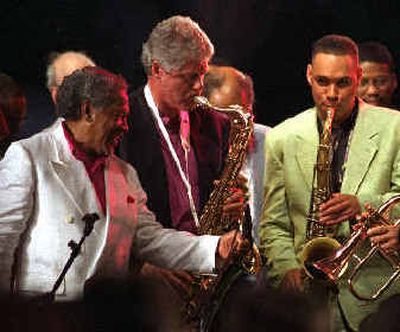Jazz great Jacquet bequeaths harmony, joy

NEW YORK – Scores of old friends and new fans gathered for a funeral at Riverside Church on Thursday, sending jazz great Illinois Jacquet off with the joy he had brought to so many of them.
“I’m grateful to do this for a dear friend,” said horn player Clark Terry, who with saxophonist Jimmy Heath filled the cavernous church’s neo-Gothic nave with an upbeat rendition of “Robbin’s Nest,” a Jacquet favorite. “I don’t think there is anyone who didn’t love him.”
Although the small-framed man with the big tenor saxophone was one of his generation’s best-known jazzmen, his daughter, Dr. Pamela Davis, painted a more personal portrait of a father who loved his St. Albans, Queens, neighborhood since moving there in the late 1940s, raised his family there, and never moved away.
Choking back emotion as she addressed the hushed church audience, she said Jacquet was more than a complex musical creator. He was also a doting father, who drilled her in math and spelling, provided her with dance and piano lessons and introduced her to his famous neighbors.
“How many people could say … Ella Fitzgerald lived around the corner” or could “go swimming as a kid in Count Basie’s block-long swimming pool,” she asked. “I didn’t know who they were, I just knew them as friends of my dad’s.”
The Louisiana-born Jacquet, who was 81 when he died of a heart attack at his home July 22, sprang to musical prominence from a pantheon of jazz greats.
Jacquet, who lived and played in Texas as a teen, was discovered by Nat King Cole during a 1940 jam session in Los Angeles, achieved stardom as a member of Lionel Hampton’s band, appeared with Cab Calloway and Lena Horne in the 1943 musical “Stormy Weather,” and in 1946 succeeded sax great Lester Young in Count Basie’s Orchestra.
A tireless worker, he was 60 when he formed his own big band in 1983, and continued to play frequently until he died.
Although best known for his screeching and honking tenor sax solo on “Flying Home,” which he first performed with Hampton in 1942, he continued to draw a faithful following up until his last performance at Lincoln Center two weeks ago.
In a brief tribute, pianist Hank Jones said Jacquet’s 1942 performance influenced every prominent jazz saxophonist who has played since then.
“It was the most influential solo in the entire history of music,” Jones said. “Everyone had to know it.”
Dan Frank, a longtime friend of Jacquet who came to the funeral from Brookline, Mass., said he met the jazzman when his brother-in-law took him to a show when he was 13. Jacquet noticed Frank had injured his eye and, after inquiring about it, encouraged Frank to call him if he needed help. Jacquet gave Frank his home telephone number – the same one he had until his death.
“He was a character of characters,” Frank said.
Attendees of the funeral seemed particularly moved by film excerpts from the 1992 documentary “The Texas Tenor – The Story of Illinois Jacquet.”
Flashed on a screen in front of the church, the film featured scenes from his storied career, including a performance before a cheering crowd at a theater in New Jersey. A couple attending the funeral – performers from Harlem’s Cotton Club – got up and danced a jitterbug to the music.
“I know I won’t be here forever,” Jacquet said in the film. “I just want to contribute something that will last forever.”